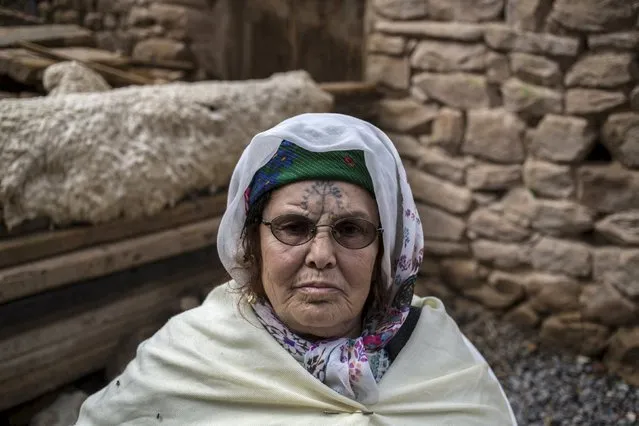
Khadra Kabssi, 74, a berber woman from the Chaouia region, who has facial tattoos, sits in her home in Chalma at the Aures Mountain near the eastern city of Batna, Algeria October 9, 2015. Among the Chaouia people of the Aures mountains, a woman's beauty used to be judged by her tattoos. Kabssi was tattooed aged 21 by her cousin following Algeria's independence from France. "I did it because I wanted to be beautiful for the independence of my country and all the girls my age were tattooed," Kabssi said. "At that time we were very young, our thought was far from committing any sin. I just wanted to feel pretty". Today she doesn't regret being tattooed, despite being told by religious people and friends around her that she has committed a sin and so will endure punishment after her death. "I don't believe what they are saying at all," she said. "If the snake, as they said, wants to eat me then he is free to do it. I will be dead, I'll feel nothing". (Photo by Zohra Bensemra/Reuters)
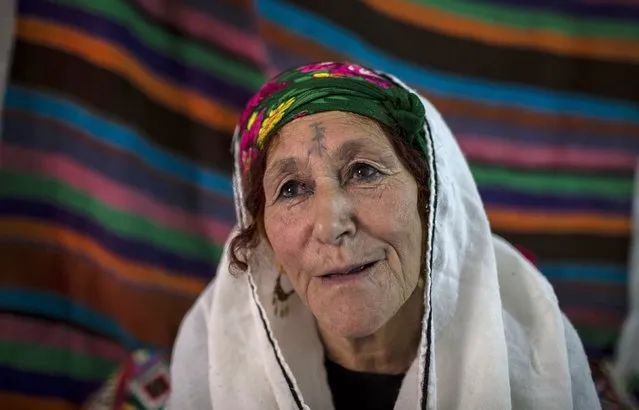
Fatma Benyadir, 75, a berber woman from the Chaouia region, who has facial tattoos, sits inside her house in Chalma at the Aures Mountain near the eastern city of Batna, Algeria October 9, 2015. A local woman tattooed Benyadir when she was 12 years old. "I did it without telling my parents. All the girls my age were tattooed", Benyadir said. "I had to endure excruciating pain, the anger of my parents later, just to look pretty". Some believers have told these Muslim women that by allowing the tattoos they committed a sin according to Islam. To make amends, those who regret having the tattoos give away their treasured silver jewellery to the most deprived women they know. Benyadir regrets being tattooed and has given away her silver after rubbing it on her tattoos, which gave her the feeling that she was rubbing them away, she said. (Photo by Zohra Bensemra/Reuters)
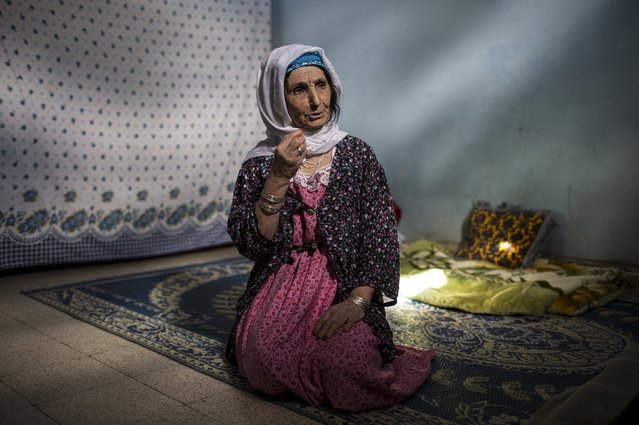
Aisha Djelal, 73, a berber woman from the Chaouia region, who has facial tattoos, gestures as she sits inside her house in Babar, Algeria October 10, 2015. Djelal was tattooed when she was 25. She wanted to be more attractive than other girls her age. Among the Chaouia people of the Aures mountains, a woman's beauty used to be judged by her tattoos. Traditionally, the more a woman was tattooed the higher she was prized by local men. Some believers have told these Muslim women that by allowing the tattoos they committed a sin according to Islam. To make amends, those who regret having the tattoos give away their treasured silver jewellery to the most deprived women they know. "I've given away all my silver jewellery after turning the offering seven times on my tattoo while I was crying", said Aisha. "I feel like every tear has washed away a bit of my tattoo". (Photo by Zohra Bensemra/Reuters)
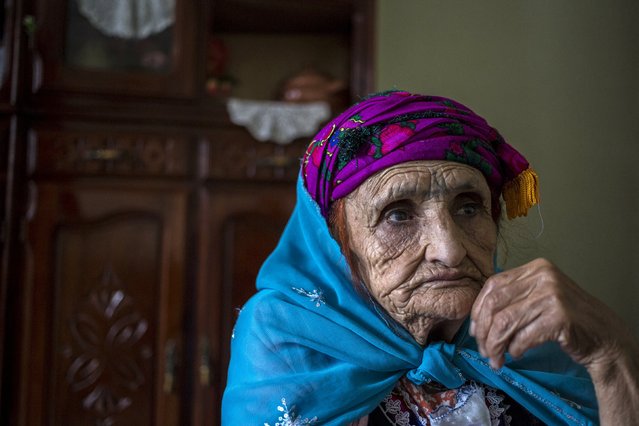
Djena Benzahra, 74, a berber woman from the Chaouia region, who has facial tattoos, sits inside her house in Ouled Azzouz in the Aures Mountain, Algeria October 9, 2015. Benzahra was forced to have a tattoo when she was 9 years old by her mother, who wanted her to look beautiful. All the girls her age were tattooed, her mother said. "I still remember, it was so painful and I was crying, refusing to be tattooed", Djena said. Today even if her tattoo looks small she regrets allowing her mother to do it, because, like all tattooed women, religious people around her have told her that she has committed a sin. "To ask forgiveness from God, I've given away all my silver jewellery after turning the offering seven times on my tattoo". (Photo by Zohra Bensemra/Reuters)
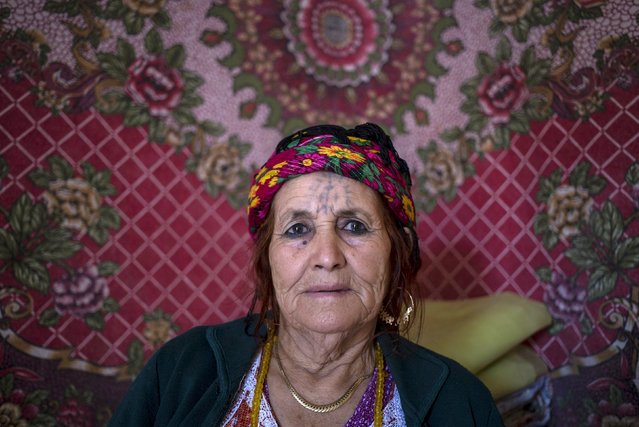
Fatma Haddad, 80, a berber woman from the Chaouia region, who has facial tattoos, sits inside her house in Chalma in the Aures Mountain, Algeria October 9, 2015. Haddad was tattooed aged 18 by a local woman. "I did it because all the girls my age were tattooed", Haddad said. Today she regrets being tattooed. Some believers have told these Muslim women that by allowing the tattoos they committed a sin according to Islam. (Photo by Zohra Bensemra/Reuters)
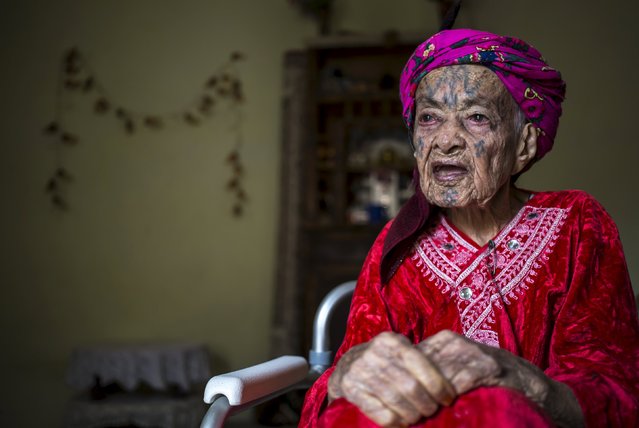
Fatma Tarnouni, 106, a berber woman from the Chaouia region, who has facial tattoos, sits inside her house in Taghit in the Aures Mountain near the eastern city of Batna, Algeria October 8, 2015. Fatma was tattooed aged 10 by a man from the Sahara region. "It was the rule, it was fashionable too. All the girls were tattooed. To be beautiful, you had to be tattooed, so I did it." Some believers have told these Muslim women that by allowing the tattoos they committed a sin according to Islam. "Today I regret being tattooed", Tarnouni said. "I will be punished by God and I would be eaten by the snake in my grave. If I knew it was not permitted by my religion, of course I would not have done it". (Photo by Zohra Bensemra/Reuters)
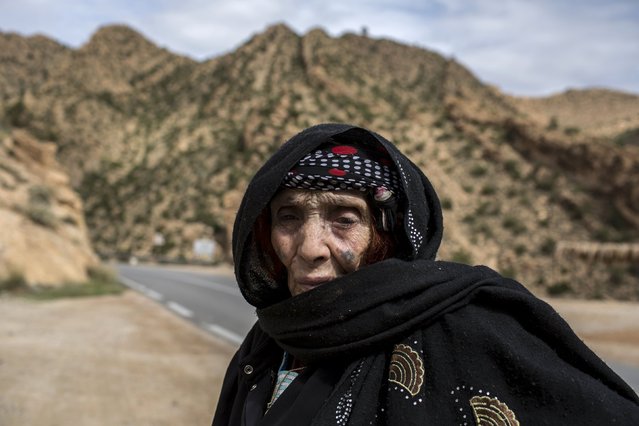
Mazouza Bouglada, 86, a berber woman from the Chaouia region, who has facial tattoos, poses for a photograph in Taghit in the Aures Mountain, Algeria October 8, 2015. Bouglada was tattooed aged 7 by a nomadic man from the Sahara region. She was advised by her mother to get tattooed. The more she got tattooed the more she showed off. Even if she still remembers the pain, she felt beautiful once it was done, Bouglada said. She was very proud of her stars on her cheeks. Her eldest sister had been tattooed before her and she wanted to imitate her. Bouglada said she has now given away all her silver jewellery to atone for the sin that believers told her she had committed by being tattooed. (Photo by Zohra Bensemra/Reuters)

Djemaa Daoudi, 90, a berber woman from the Chaouia region, who has facial tattoos, sits outside her house in Inoughissen in the Aures Mountain near the eastern city of Batna, Algeria October 8, 2015. Daoudi was forced to have a tattoo by her husband just after their wedding when she was 15 years old because it was a fashion. A local Berber woman tattooed her. Some believers have told these Muslim women that by allowing the tattoos they committed a sin according to Islam. Today Daoudi regrets being tattooed. "Even if it was not my decision at the time to be tattooed, to ask forgiveness from God, I've given everything I consider precious, like my silver jewellery and my wool, as alms", Djemaa said. (Photo by Zohra Bensemra/Reuters)
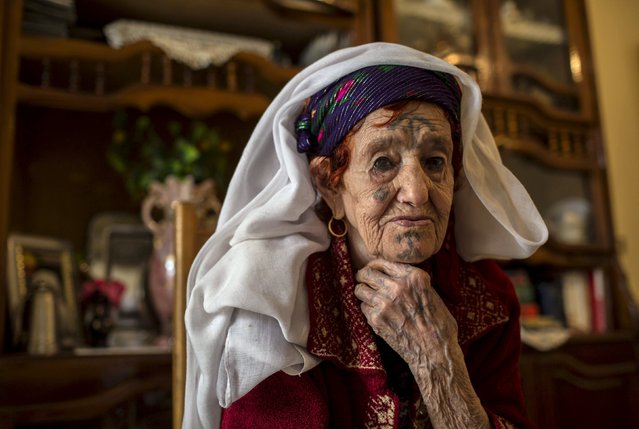
Fatma Badredine, 94, a berber woman from the Chaouia region, who has facial tattoos, sits inside her house in Arris at the Aures Mountain near the eastern city of Batna, Algeria October 8, 2015. Traditionally, the more a woman was tattooed the higher she was prized by local men. Badredine was tattooed aged 13 years old by a nomadic woman from the Sahara region. "I had to endure excruciating pain just to look pretty", Badredine said. "I wanted to have the tattoo removed but my doctor advised against it, my age doesn't allow it". Some believers have told these Muslim women that by allowing the tattoos they committed a sin according to Islam. To make amends, those who regret having the tattoos give away their treasured silver jewellery to the most deprived women they know. Even so, one woman said being tattooed brought her luck and allowed her to have many children, saving her marriage in the process. (Photo by Zohra Bensemra/Reuters)

Khamsaa Hougali, 68, a berber woman from the Chaouia region, who has facial tattoos, sits inside her house in Bouhmama near the eastern city of Khenchela, Algeria October 10, 2015. Among the Chaouia people of the Aures mountains, a woman’s beauty used to be judged by her tattoos. "In my case it was different. My stepmother advised me to get tattooed to bring luck after the sudden death of my first three children. My cousin and sister-in-law tattooed me. I had the feeling that God would give me the children I wanted and save my marriage. It was not acceptable to be a wife without having children. Believe it or not, but what I know is, that after being tattooed I had six children and they are still alive," Hougali said. Some believers have told these Muslim women that by allowing the tattoos they committed a sin according to Islam. To make amends, those who regret having the tattoos give away their treasured silver jewellery to the most deprived women they know. Hougali doesn't regret the tattoo, despite been told by religious people around her, that she has committed a sin. "I just followed the tradition of my ancestors and it was for a good purpose as it saved my marriage". (Photo by Zohra Bensemra/Reuters)
01 Nov 2015 08:02:00,
post received
0 comments
